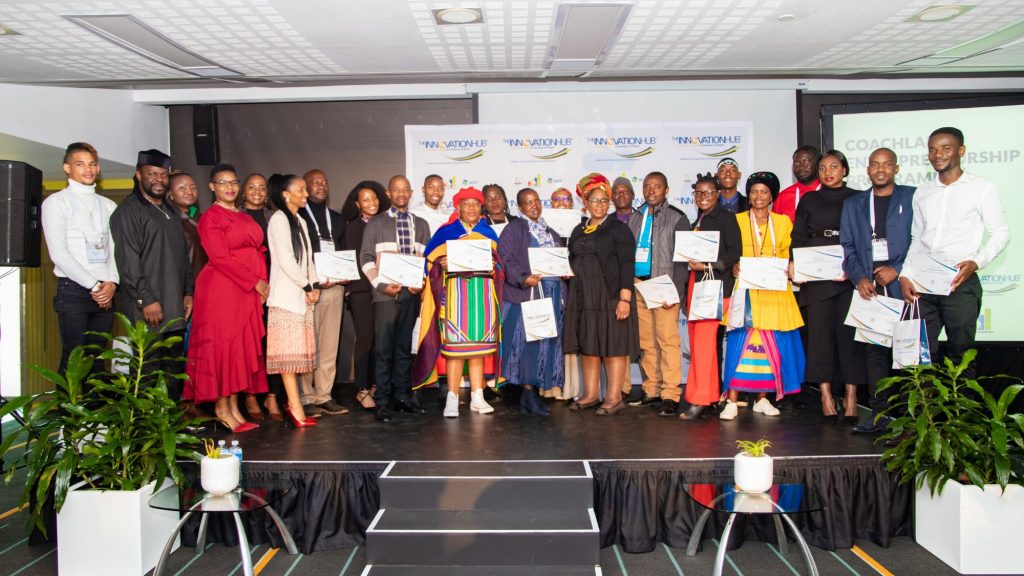South Africa’s esports scene is set for a major showdown as Hyprop and MTN introduce SHIFT COD, a Call of Duty tournament forming part…
Innovation Hub celebrates 57 CoachLab start-up founders

Following months of intensive learning and personal coaching, 57 entrepreneurs from across South Africa graduated from the 2021 CoachLab Entrepreneurship Programme. The ceremony was attended by leading government, business and academic figures.
It coincided with a two-day alumni conference on leveraging partnerships to boost indigenous knowledge systems (IKS)-based innovations. This event included a product exhibition showcasing some of the best innovations and start-up businesses.
Founded and managed by The Innovation Hub (TIH), a subsidiary of the Gauteng Growth and Development Agency, the CoachLab Entrepreneurship Programme capacitates IKS holders and entrepreneurs to commercially exploit their indigenous knowledge and products for the benefit of the communities they come from and the country at large.
With a special focus on indigenous knowledge systems, the programme prepares participants to hit the ground running as African business leaders and empowers them to incorporate best practices to yield robust businesses in their communities.
TIH board chairperson Kgotso Maja, an advocate, remarked, “Our flagship CoachLab entrepreneurship programme has been dedicated to growing a cohort of IKS innovators and entrepreneurs since its establishment in 2013.
“We are indebted to the department of science and innovation, and in particular their IKS division for their vision and relentless efforts to elevate the IKS discourse locally and globally, and for this strategic partnership that aims to capacitate entrepreneurs to commercially exploit their indigenous knowledge and products for the benefit of the community.”
Since its inception, the CoachLab programme has impacted over 250 participants who have each completed six challenging modules to hone their knowledge of business, finance, marketing, leadership, and operations. The 57 graduates from the 2021 cohort had received fully sponsored training, virtually, valued at about R35 000 per annum.
Pieter Holl, an advocate and chief executive of The Innovation Hub, thanked the graduates for their hard work. He said, “We are proud of what CoachLab and its many participants have achieved over the past decade. The programme aims to provide the support needed to fuel the next generation of innovators and entrepreneurs, especially those individuals looking to leverage indigenous knowledge to create sustainable businesses and make a positive impact.
“This group of outstanding graduates have more than proven their talent, determination, and capabilities, and I would like to offer each of them my sincere congratulations on this phenomenal achievement. We will be looking at your careers with great interest.”
Among the many programme trainees over the years participants who achieved praiseworthy success after the programme ended, the following alumni are among those who stood out from the crowd.
One of the exciting programme alumni start-up is Pri-Jap Biolife, founded by Prince Edward Nkosiyokuthula Msomi, which focuses on immune-enhancing complementary medicines developed from indigenous African knowledge. The products were tested commercialised, and a website developed alongside the CoachLab programme, and Msomi received product development and sales training, as well as additional funding from TIH.
Another notable, start-up alumni is Vhupo Projects was founded by Chief Mavhungu Gorge Ramabulana, which makes use of integrated traditional medicine to help care for modern chronic disease problems. CoachLab supplied brand development, business planning, and financial management training to Ramabulana, as well as additional funding for further product development and setting up manufacturing facilities.
During the conference, the national director of IKS at the department of science and Innovation, Dr Aunkh Chabalala, expanded on the department’s view on IKS implementation,
He said, “Our work is based on what we call the Ubuntu of science. The way we do things is predicated on African knowledge systems, and we promote this idea by providing resources such as infrastructure, planning, and human capital development, as we did with CoachLab. In the end, we promote Africology and Afrocentricity in how we conduct research and development.”
The conference also featured three-panel discussions by leading scientists, researchers, government officials and business people, discussing topics such as stakeholders’ IKS-based innovations support; the challenges facing IKS innovators; and unlocking the commercialisation pathways of IKS-based innovations in the fourth industrial revolution (4IR) era.
Other CoachLab alumni were further given the opportunity to showcase their businesses, their use of IKS, and their impact on local communities through pitching to government stakeholders, business representatives, and potential investors.
Maja explained that it had been a busy couple of months at TIH. In August, 60 learners graduated from the Mobile Device Repairers programme, acquiring skills to start their cell phone repair businesses in their communities.
TIH also hosted the Green Youth Indaba which brought industry leaders and aspiring young entrepreneurs together to share opportunities in the green economy environment.
Finally, at the end of July, 67 school learners learned about opportunities in technology and robotics at the TIH’s eKasiLabs.
“The Innovation Hub is performing some phenomenal work, and as a country, we can all be very proud of the transformative potential of the pipeline of projects that are currently underway,” he said.
ALSO READ: The power of she-networking and women-focused funding

